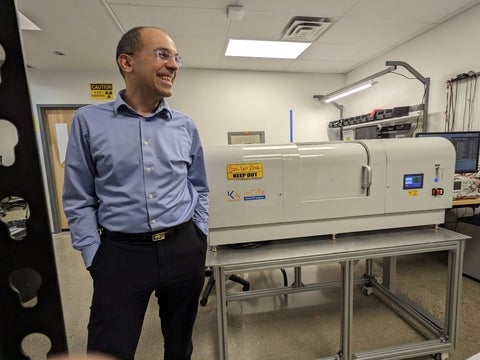In 2018, the Waterloo Institute for Nanotechnology (WIN), under the leadership of its Executive Director, Professor Sushanta Mitra, announced a new funding program, the WIN Interdisciplinary Research Funding Program (WIN-IRFP). This competitive program was created to provide seed funding and support to WIN members working on interdisciplinary research.
One of the first awardees of this prestigious funding was Karim S Karim, Professor of Electrical and Computer Engineering. In March 2018, Karim’s project received an award of $100,000 for one year, which for Karim translated into working with his partners, Professor Robin Duncan (Kinesiology and Health Sciences) and Professor Peter Levine (Electrical and Computer Engineering), on developing a low-cost, efficient 3D X-ray imaging machine. Duncan performs mouse imaging for histopathology in her cancer research that helped define the specifications for the novel 3D X-ray scanning micro-computed tomography system. Levine is an expert in CMOS integrated circuits and a leader in the design of pixelated imaging circuitry. Both Duncan and Levine’s expertise complemented that of Karim in amorphous selenium sensor design and development for the high-resolution X-ray detector that was a key component of the novel 3D X-ray imaging system being developed.
It has now been five years since the funding for this project ended, but the impact of WIN-IRFP continues. The funding supported Dr. Chris Scott’s research who was then a Waterloo PhD student leading this project and eventually ended up as the project leader for the inCiTe at Karim’s spin-off company, KA Imaging.
In 2015, Karim along with Amol Karnick and Sina Ghanbarzadeh, founded KA Imaging with the vision of “Innovative X-ray Everywhere”. KA Imaging has set out to disrupt the world of X-ray imaging while providing solutions to the medical, veterinary, industrial and scientific imaging industries.
Since its inception, KA Imaging has hit some impressive milestones. In 2016, they created the world’s first Metal-Semiconductor-Metal (MSM) sensor with TFT-LCD technology, in 2017 the first multi-energy or spectral (false-colour) X-ray, and in 2019, the WIN-IRFP funding directly supported the launch of the inCiTe 3D X-ray Microscope. This revolutionary technology uses Propagation-based phase contrast X-ray imaging to visualize materials that have poor X-ray absorption while exposing the subject to a lower radiation dose than traditional X-ray machines currently on the market. The scanner utilizes patented technology that creates X-ray phase contrast effects.
The WIN-IRFP provided critical funding to translate the new X-ray technology developed at Waterloo into a prototype imaging system that was showcased to early users at various universities and the National Research Council of Canada. The WIN-IRFP-supported prototype X-ray system enabled KA Imaging to obtain Build in Canada Innovation Program (BCIP) funding to scale up the inCiTe X-ray microscope for commercialization and making KA Imaging the first and only company to this day, to offer an affordable benchtop 3D phase contrast X-ray commercial scanner.
This was exactly my vision of WIN-IRFP when I launched it in 2018. Through this initiative, we support the innovation and ingenuity of our WIN members. They are creating a real impact on the global scale, and WIN-IRFP is providing the seed and resources to make this happen. In the case of Prof. Karim’s project, it is truly democratizing high end X-ray imaging technology and aligns with the UN Sustainable Development Goals.

From the very outset, the goal of this project was to enable high resolution, high contrast, 3D X-ray imaging of organic and low Z materials for all researchers in their own labs at universities. The inCiTe micro-CT does away with the need for time consuming steps such as specimen slide preparation for histopathology and sample preparation for scanning electron microscopy (SEM). New scientific research is enabled, such as longitudinal studies of biological specimens and non-destructive imaging of sensitive non-metallic organic samples that cannot be adequately prepared for SEM.
Since 2018, WIN has supported its members pursuing interdisciplinary research through the IRFP allowing researchers to collect initial data points and insights as the first steps to targeting established high-value funding programs. The WIN-IRFP is possible through a $1.5 million investment in strategic funding for interdisciplinary research. To date, 33 joint projects have been funded to over $1.43M.
Since 2019, KA Imaging has continued to grow and achieve greatness, with the leadership and expertise of Professor Karim. This is an extraordinary example of success from one of the first recipients of the WIN-IRFP.